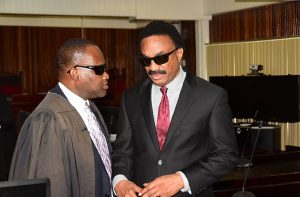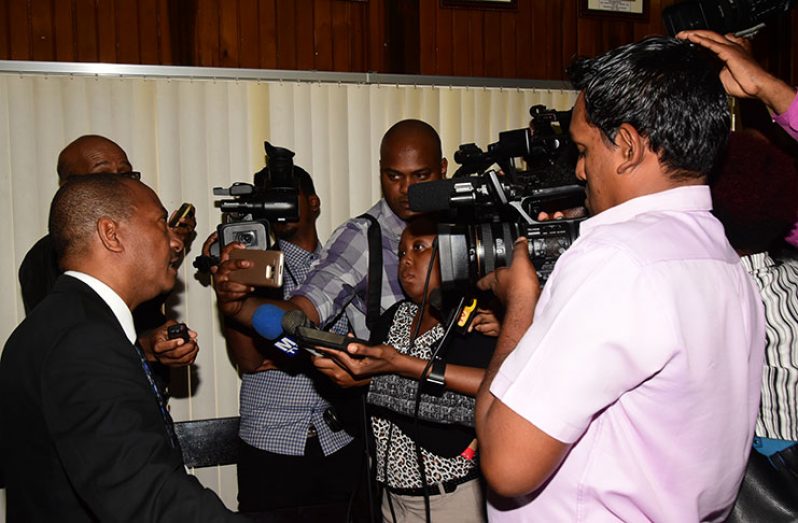Justices Singh, BS Roy uphold Chang’s High Court ruling
THE Court of Appeal by a two-one majority on Wednesday upheld the High Court ruling that the presidential term limit is unconstitutional and void.
Now retired Chancellor of the Judiciary (ag) Carl Singh, and Justice BS Roy upheld Chang’s ruling , while Chief Justice (ag) Yonette Cummings-Edwards disagreed. Singh, who is the presiding judge of the Court of Appeal, heads into retirement from today. Attorney General and Minister of Legal Affairs Basil Williams, the first-named appellant and former Speaker of the National Assembly, Raphael Trotman, the second-named appellant, have both indicated that they will file an appeal to the Caribbean Court of Justice (CCJ) within 30 days. They are confident that their arguments will stand strong at the CCJ.
Similarly, attorney for the Respondent, Shawn Allicock, believes that the issue is one of national importance and must be resolved for the benefit of all. He said he is satisfied with the judgment of the Court of Appeal. “We are confident… we won’t be here if we didn’t think it was something that was winnable. The people of Guyana are deserving of the court hearing the matter,” said Allicock.
Both the attorney general and Trotman had appealed against the decision by former Chief Justice Ian Chang in 2015 to remove the presidential term limit here. In the case brought by Cedric Richardson, a resident of Georgetown, just before the May 2015 General and Regional Elections, to challenge the Amendments made to Article 90 of the Constitution that were enacted in 2000 following a bipartisan Constitutional Reform Process, Justice Chang ruled, among other things, that the presidential term limit was unconstitutional without the approval of the people through a referendum.
He also ruled that persons who have become Guyanese citizens by virtue of registration, can run for President. Article 90 of the Constitution states: “A person elected as President after the year 2000 is eligible for re-election only once,” and clause (3), which states, “A person who acceded to the presidency after the year 2000 and served therein on a single occasion for not less than such period as may be determined by the National Assembly, is eligible for election as President only once.”
Both the Attorney General and Attorney Roysdale Forde, who represented the former Speaker of the National Assembly, in their submissions maintained that Justice Chang’s ruling was flawed and should be struck out but on Wednesday, it was only Justice Yonette Cummings-Edwards who submitted that the appeal by the Attorney General and former speaker should stand.
VALIDLY DONE
In her dissenting submission, Justice Cummings-Edwards said that Act #17 of 2000 did not require approval by referendum and noted that there is no dispute that it was validly passed and thus “I uphold the constitutional validity of Act No.17 of 2000.”
Secondly, insofar as Act No 17 of 2000 purported to amend article 90 of the Constitution as the Honourable Chief Justice as he then was, said that amendment was not unconstitutional; the amendment was validly done. “Article 90 (2) and (3) prescribes that a person elected as president after the year 2000 is entitled to serve as president for only two terms. Article 90 insofar as it was amended by Act no 17 of 2000, did not either directly or indirectly alter or dilute or effect [sic], or amend Articles 1, and 9 of the Constitution.”
Justice Cummings-Edwards cited Article 1 of the Constitution which states that Guyana is an indivisible, secular, sovereign state in the course of transition from capitalism to socialism and shall be known as the Cooperative Republic of Guyana. She therefore questioned which aspects of the amendments have affected the country’s indivisible, secular and democratic nature, as well as sovereignty by the imposition of a term limit of two terms to the presidency.
The Justice of Appeal also questioned what aspect of Guyana’s transition from capitalism to socialism and to be known as Cooperative Republic of Guyana, has been affected by imposing a term limit of two terms.
“The answer is obvious from the ruling; Article 9 provides that sovereignty belongs to the people who exercise it through their representatives and democratic organs established by or under this Constitution. Clearly, the people of Guyana in whom sovereignty lies, no doubt exercised their sovereignty through their representatives, Parliament and local democratic organs.
“Act No.17 of 2000 was validly passed by way of two-thirds majority, it did not affect, either directly or indirectly Articles 1 and 9 of the Constitution and do not require a referendum. It is not unconstitutional; it did not diminish the democratic right of the electorate in electing a person of their choice as President. I hold that Parliament acting intra vires the Constitution by limiting the presidential term to two terms, I will therefore allow the appeal,” said Justice Cummings-Edwards in her ruling.
ERRONEOUSShe stressed that the amendments did not amend the people’s right to vote or choose a president, and noted that the ruling by Justice Chang which stated that the amendment to the Constitution interferes with the democracy of the people was erroneous.
“Because of the very principles of democracy and sovereignty, the people themselves gave Parliament that power, under Article 165 to make the necessary amendments in keeping with the various levels of entrenchment.”

“…the right to vote, the right to choose a president remains unaffected by the inclusion of the term limit.”
Meanwhile, Justice Singh in delivering his decision said laws which in effect will prevent citizens from their Constitutional right to freely elect someone of their choice is unconstitutional.
“In my view, the critical question which must be determined in this appeal is whether by altering Article 90 of the Constitution, Act No17 of 2000 also alters Articles 1 and 9 of the Constitution. It would be important to closely examine whether any of the core features of Articles 1 and 9 would be affected by Act No.17 of 2000.”
Justice Singh submitted that the concepts of sovereignty and democracy are critical to the answering of that question and noted that the Constitution must be interpreted in a broad, liberal, purposive and holistic way, so that the role of Guyanese citizens to exercise their democratic entitlement is properly interpreted.
DEEPLY ENTRENCHED
He noted that the provisions of Articles 1 and 9 of the Constitution ought not to be “lightly regarded” as they are deeply entrenched and provide substantive protection to the people of this country.
“The effect of the amendment to Article 90 of the Constitution by Act No. 17 of 2000 is to create further restrictions to the persons whom the people of Guyana could choose to elect as president, even though the people may consider any such restricted person suitable to be elected the president of Guyana. Therefore, by excluding those persons from consideration by the people for election to the office of president,that exercise of sovereignty by the people to freely choose who they wish to govern them is suppressed,” said the Chancellor (ag).
He said before Act No.17 of 2000 was passed, those restrictions did not exist. He said by virtue of the restrictions imposed by the amendments, he concurs with former Chief Justice Chang that the Act is unconstitutional and of no legal effect, as it dilutes and diminishes the rights of citizens.
“The observations of the learned Chief Justice coincide with my own views on the effect of Act No 17. of 2000, the freedom of the people of Guyana to choose their representatives, captured in the context of sovereignty and democracy in Articles 1 and 9 cannot be limited by the addition of further disqualification, unless approved by the electorate. In sum therefore, the further restrictions on the people’s choice for president… created a different democratic state referenced Articles 1 and 9.”
Justice Singh made it clear that the people of this country are the most important part of the State, and as such, should have the opportunity to elect representatives of their choice to govern them by periodic elections.
“It is quite evident therefore that any law that would have or effect to suppress that right …would be inconsistent with the Constitution as null in force and void.”
He contended that the Constitution could only be changed by referendum, that is, by the people themselves.
“The effect of the amendments occasioned by Act No. 17 of 2000 was that the freedom of the people of Guyana to choose whom they wish to represent them became controlled by the National Assembly. While it is true that the Guyanese elector votes for a party list, the political party is the instrumentality of the people and it is through the political party that the people exercise their sovereignty,” Singh added, while quickly pointing out that he must not be understood to be saying that the National Assembly does not have the power to effect an amendment to the Constitution.
Meanwhile, the Chancellor considered the submission by Attorney General Williams as “incredible,” when he stated that the proceedings should be deemed void ab initio of a blunder made by the respondent in the originating summons. Reference was made to Act No. 17 of 2001 instead of Act No.17 of 2000. Singh determined that it was an error and noted that none of the parties to the matter had been affected negatively by it. Justice BS Roy simply concurred with the Chancellor’s decision.



.jpg)








